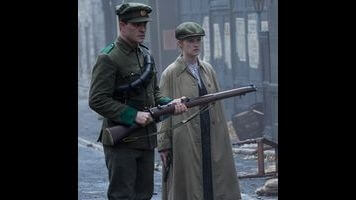On April 24, 1916, Easter Monday, seven members of the Military Council of the Irish Republican Brotherhood organized an armed insurrection in Ireland to end British rule and establish an independent Irish Republic. The battle lasted six days before the British Army suppressed the uprising and the rebels agreed to an unconditional surrender. All told, close to 500 people were killed and 2,600 were wounded during the Easter Rising, and the majority of the casualties were civilians. The sprawling new miniseries Rebellion follows this conflict from its inception to its aftermath through the eyes of Dublin citizens and soldiers on both sides of the divide, with friends and family pitted against each other. While Rebellion admirably attempts to capture the myriad ideological and political complexities of the Easter Rising, its ungainly scope, frequently stale writing, and flat visual style keep the miniseries from reaching the heights its compelling story deserves.
Series writer Colin Teevan introduces a plethora of characters in the first episode, so many that it will almost certainly be difficult for even the most attentive viewers to keep track of who they are. Some, but hardly all, of them include Elizabeth Butler (Charlie Murphy), an upper-class doctor-in-training who joins the rebellion out of a sense of idealism; Frances O’Flaherty (Ruth Bradley), a dyed-in-the-wool member of the rebellion with a fierce passion for the cause; May Lacy (Sarah Green), an apolitical member of the British Civil Service who’s broiled in an affair with her boss Charles Hammond (Tom Turner); Arthur Mahon (Barry Ward), a private in the British Army suffering from PTSD during his time in World War I, and his brother Jimmy Mahon (Brian Gleeson), a committed socialist whose ideals are frequently shaken during the uprising. Teevan sketches out these characters exclusively through ideology and desire, a necessary move considering the amount of narrative ground that has to be covered. But for a series ostensibly about ordinary citizens’ relationship with the tumultuous events of Irish independence, the large majority of them remain strikingly one-dimensional, not helped by the all-around patchy performances from the large ensemble cast. The main characters in Rebellion eventually become distinct enough to not blend together; they just don’t exist in their world outside of their specific narrative function.
The main problem lies with the series’ overly broad scope, which stretches just about every moment too thin. Teevan tries to honestly capture the multiple perspectives in the conflict—the socialist rebels, the upper crust, the Irishmen fighting in the British army, the civil servants, the family members on the sidelines—but he doesn’t have the finesse needed to provide all of them with the requisite impact. Editor Ben Mercer does a helluva job coherently cutting between the storylines, some of which are so far on the fringes of the central conflict that it’s a wonder why they’re included at all, and yet they all too frequently become muddled together. Some of them never rise above afterthoughts—like Elizabeth’s brother Harry’s (Michael Ford Fitzgerald) apathy and reckless immaturity—and even the most thoughtful arcs are often rendered mere shadows on a gray tapestry.
Furthermore, Rebellion spends little time establishing the political details of the Uprising, like the distinct identities of the Irish Volunteers, the Irish Citizen Army, and Cumann Na Mban, the three major factions of the rebellion. It’s an understandable choice given that it’s an Irish production dramatizing a major event in their national history, but that coupled with the rapid cross-cutting may make some of the particulars difficult to follow for those unfamiliar with the historical context. While Teevan has absolutely no obligation to simplify the Easter Rebellion for international audiences, it nevertheless highlights some of the foundational flaws in the series, mainly the rushed narrative pacing. Though Rebellion mainly covers the six-day rebellion, five-hour-long episodes feels like too little time for Teevan’s vision, which demands a measured rhythm to properly develop the multiple angles and narrative intricacies. There’s only so much that blunt expository dialogue can accomplish, and sometimes even the most personal, emotionally driven stories need room to thrive.
Yet, when Rebellion enters a consistent rhythm, mainly in episodes two and three, the actual uprising is compelling enough to overcome the series’ imperfections. While series director Aku Louhimies’ functional style doesn’t do the series any favors, he’s adept at staging most of the battle scenes and injecting them with the necessary tension and suspense. Tim Fleming’s muted photography in the entire run stands out providing the frame with a sickly gray color that matches Rebellion’s mood quite well. Teevan’s writing shines on a micro level, especially the way he captures how the staunchest of ideals can falter when faced with complex realities, like Elizabeth’s stricken face when she sees her first sign of bloodshed or Arthur’s nervousness when he has a loaded gun aimed at his own brother. Rebellion has many character moments that shine in the moment, but that sadly don’t add up to much when taken as parts of a whole.
This Sunday marks the 100th anniversary of the Easter Rising, a stunning moment in history when passionate citizens stood up and demanded autonomy from their rulers. Rebellion has clear, palpable compassion for those who valiantly fought for freedom and aims to give their story the epic sweep it deserves. Though it doesn’t get there, the series deserves points for ambition, seeking to depict not just the ideals that engendered such an uprising, but how those same ideals can have devastating consequences to the delicate societal fabric. Rebellion tries to do too much at once, but much like the Easter Rising itself, it’s the trying that deserves plenty of attention.









































